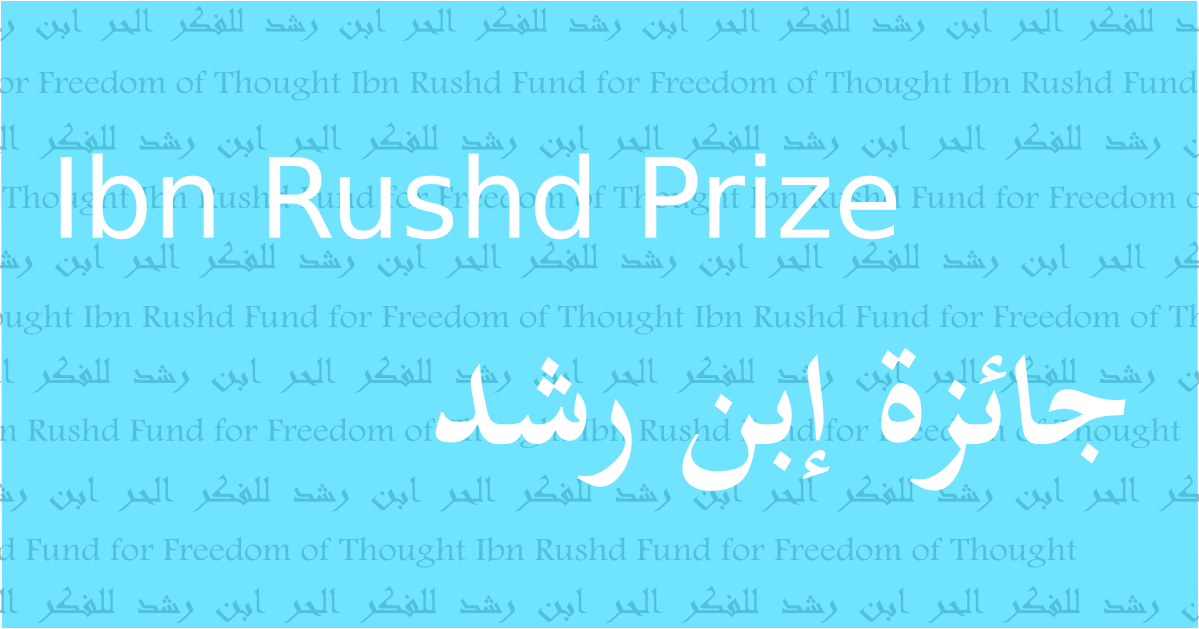The Ibn Rushd Prize 2022
calls for:
An institution or a person who fostered or protected religious freedom in their region or country including the freedom from religion and the possibility of choosing another religion and therewith countering all kinds of sectarianism as well as the abuse of power by political and religious authorities.
In civilizations in the Arab World throughout history, religious tolerance and rights existed on many levels in different locations, the most outstanding historical examples in the collective Arab memory being the Umayyad and Abbasid dynasties, as well as Al-Andalus under the Caliphate of Cordoba (929–1031). In the profoundly tolerant atmosphere of the times, science, literature and philosophy flourished. Both classical Islamic ethics and Sharia, as well as religious laws and courts of other religions, including Christianity, Judaism and Hinduism, coexisted.
But it was not until the 20th century, when persecution and killing because of religious beliefs culminated so infamously, that human rights were formally affirmed and formulated precisely. In 1948, the Universal Declaration of Human Rights defines freedom of religion, or freedom of belief, in Article 18 as follows:
“Everyone has the right to freedom of thought, conscience and religion; this right includes freedom to change his religion or belief, and freedom, either alone or in community with others and in public or private, to manifest his religion or belief in teaching, practice, worship and observance.”
Many countries in the world have since witnessed major transformations in the direction of achieving religious freedoms. And yet, while human rights organizations strive to foster and implement the right to freedom of religion for all individuals around the world, there is admittedly still a long way to go.
At the present time, harsh incrimination, discrimination and punishment of those criticizing their religious institutions can be observed also in the Arab World. This applies to those who refuse to adhere to a certain faith, too. Restrictions are often imposed by governments themselves which tend to use the predominant religion and the religious clergy to legitimize their existence and to enforce their leadership.
Furthermore, religious communities often use religious rules as a pretext to control their members socially.
In addition to the spread of sectarianism, sectarian discrimination and violence, the space for those who claim the right not to believe – which emerged, with great prominence, after the Arab Spring Revolutions – is constantly being diminished, with apostasy still being a capital offense in many countries, often ending in execution.
We pay tribute to the courageous women and men, human rights activists, lawyers and organizations, and all others who render outstanding service to humanity by standing up for individual freedom of thought and freedom of belief, and, by doing so, put themselves in great danger.
The Ibn Rushd Prize 2022 therefore calls for:
an institution or a person who fostered or protected religious freedom in their region or country – including the freedom from religion and the possibility of choosing another religion, as well as the freedom from the obligation to marry within the same religious group – and therewith not only countering all kinds of sectarianism as well as the abuse of power by political and religious authorities, but fostering pluralism, tolerance and peace within society.
The person’s or institution’s work must have fostered and protected religious freedom sustainably for all, not only for specific individuals or specific groups in a society.
Anyone can nominate a candidate, one nomination per person. Nominations of deceased people and self-nominations will not be considered. The candidate’s immediate sphere of activity should lie in the Arab World, and they do not need to belong to any particular religion.
An independent jury will select the winner of the Ibn Rushd Prize 2022 from the incoming nominees.
To nominate, please use the form* (link) and send your proposal to nomination@ibn-rushd.org. Please provide a justification. Candidates can be nominated until June 10th, 2022. Nominations can be written in Arabic, German, English, or French. Multiple nominations will not increase the chances of a nominee.
* The Ibn Rushd Fund can only process nominations submitted with a nomination form.
The prize money amounts to € 2500, which, just like the entire prize, is financed exclusively by contributions and donations from members and supporters of the Ibn Rushd Fund.
The Ibn Rushd Prize will be awarded on September 8, 2022, in the James-Simon-Hall of the Pergamon Museum, Berlin.
If you want to know more about previous winners of the Ibn Rushd Prize, please go to:
The Ibn Rush Prize 1999 – 2022





